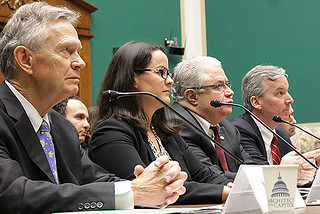Search News
For the Media
For media inquiries, call CWA Communications at 202-434-1168 or email comms@cwa-union.org. To read about CWA Members, Leadership or Industries, visit our About page.
Too Much Media Consolidation
 |
| TNG-CWA President Bernie Lunzer, second right, tells a House Energy and Commerce subcommittee that media consolidation is harming diversity of opinion and local coverage, by cutting the news-gathering ability of local organizations. |
If big media companies are allowed to keep consolidating broadcast stations and newspapers, the result will be the same as it's been for 20 years – severe job cuts and far less diversity in a community's sources of news, TNG-CWA President Bernie Lunzer told a House Energy and Commerce subcommittee.
Lunzer, who prepared the testimony with NABET-CWA President Jim Joyce, stressed that various joint-operating agreements that allow TV stations to air the same news over multiple channels, or to share newsrooms with other stations and newspapers have already badly eroded many community's access to independent news-gathering.
Republicans disagree. They called the hearing to chastise the Federal Communications Commission (FCC) for not working fast enough on new rules allowing more consolidation. Rep. Henry Waxman (D-Calif.) invited Lunzer to tell a different side of the story.
While owners and industry lobbyists continue to claim that consolidation improves the bottom-line for cash-strapped media organizations, their real agenda is that "efficiencies increase profitability into double digits," Lunzer said. He pointed to Youngstown, Ohio, where one company, LIN, operates four TV stations and two others share stories with the city's newspaper.
"When LIN consolidated stations it eliminated most newsroom jobs in the accreted newsrooms," he said. "The Vindicator has substantially reduced jobs in both broadcast and print in the last five years, operating with a combined newsroom. Not only has overall employment been reduced, but local coverage has shrunk substantially and diversity of stories and coverage as well. Cable adds almost nothing locally."
In Syracuse, NY, and Peoria, IL, Granite and Barrington Broadcasting swapped and combined news operations in each city. A Guild-commissioned study found that 70 workers were laid off and 16 were reassigned. Barrington Broadcasting now runs 3 stations in Syracuse with the same news staff.
Lunzer testified that the union agrees with FCC Chairman Tom Wheeler's goal of restricting joint sales agreements where more than 15 percent of sales are attributed to another entity. The Guild also agrees with the FCC that shared services agreements should be studied for similar restrictions.
Democrats on the subcommittee appeared committed to fighting more consolidation, while Republicans said they didn't know what all the fuss was about. In their view, the Internet and cable have created more news sources than ever. One GOP congressman boasted about hearing breaking news on Twitter, saying he didn't need TV or radio or newspapers to learn it. He failed to grasp that the tweeted news began, somewhere, with a journalist.